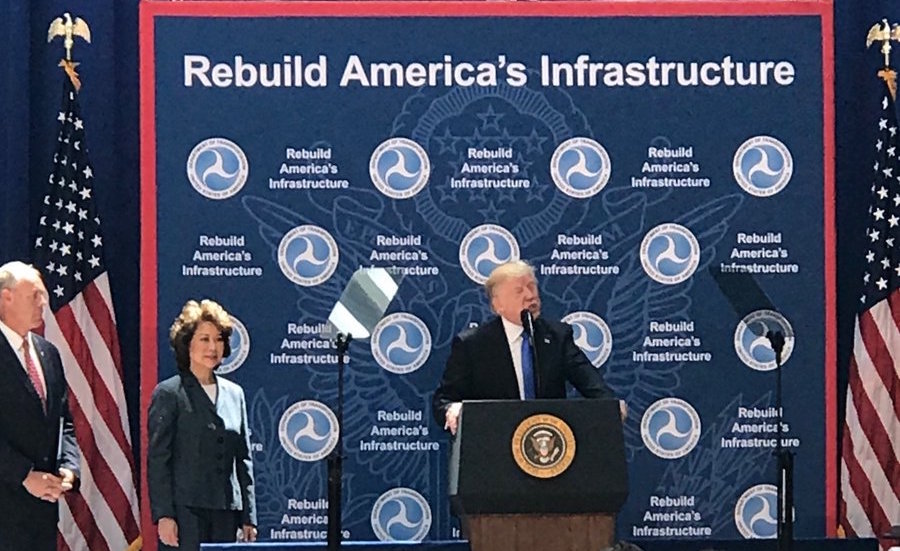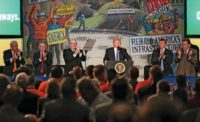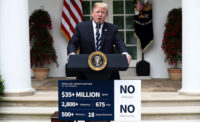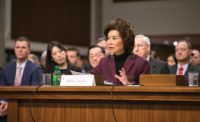President Trump has wrapped up what the White House called "infrastructure week," a multi-day series of events aimed at promoting his $1-trillion, 10-year infrastructure plan.
The week's final event was a June 9 meeting and speech at U.S. Dept. of Transportation's headquarters, where Trump focused on one often-mentioned element of his not-yet-released program: plans to reduce federal regulations and speed approvals and permits for infrastructure projects. [White House video of speech.]
He told an audience of state and federal transportation officials, union leaders, and others, "We will get rid of the redundancy and duplication that wastes your time and your money. Our goal is to give you one point of contact and deliver one decision, yes or no, for the entire federal government and to deliver that decision quickly."
Trump announced that the administration was establishing a "council" that would "help project managers navigate the bureaucratic maze." He said the council would have a new on-line "dashboard" to track projects' process through reviews.
A DOT spokesperson said that the council is the existing Federal Permitting Improvement Steering Council, a multi-agency organization that was established under the 2015 Fixing America's Surface Transportation Act. The DOT official added that the dashboard "will be an enhanced version" ot that council's current project dashboard.
The day before Trump's speech at DOT, Senators Rob Portman (R-Ohio) and Claire McCaskill (D-Mo.), the architects of the FAST Act provision creating the permitting steerling council, wrote to the president saying "given the administration's stated interest in facilitating the permitting process and infrastructure development, it is perplexing that the administration has not taken advantage of the powerful tools Congress gave it in [the FAST Act] to accomplish those goals."
Portman and McCaskill also criticized the Obama administration for not doing enough with the permitting council.
Kevin Smith, a Portman spokesman, told ENR that "we received assurances from the White House after the president's speech that the plan they are pushing will utilize the council and other tools enacted as part of the FAST Act."
In addition, Trump said as part of a "permit reform" effort, the administration is setting up a new office within the White House Council on Environmental Quality. "to root out inefficiency, clarify lines of authority and streamline federal and state [and] local procedures so that communities can modernize their aging infrastructure without fear of outdated federal rules getting in their way."
Mixed views on speedier reviews
Brian Turmaiil, a spokesman for the Associated General Contractors of America, said via email, "We fully support the president’s initiative and stand ready to assist."
Turmail said, "As the president said, the goal is to ask the same kind of tough questions about a project's benefits and potential impacts but to do so in a way that is timely. State DOTs should be able to get a yes or no on a project quickly so they can either begin work or move on."
But environmental groups are worried about the plans to expedite project reviews. The Natural Resources Defense Council said the moves could weaken National Environmental Policy Act review and public transparency provisions. NRDC President Rhea Suh said in a statement: "Any major infrastructure project must include robust public participation from start to finish. Trump’s approach and mind-set fails that test.
To illustrate the regulatory requirements that project sponsors face in gaining governmental approvals, he paged through a multi-volume environmental impact statement for the long-planned, and now complete Intercounty Connector, a toll highway in Maryland north of Washington, D.C. He said the report cost $29 million and weighs 70 lbs. The road's last section opened in 2014.
The infrastructure events began on June 5 at the White House where Trump formally released a set of principles to revamp the U.S. air traffic control system. Under the plan, outlined in Trump's fiscal 2018 budget proposal, a new nonprofit nongovernmental entity would take over air traffic control responsibilities from the Federal Aviation Administration.
Focus on waterways
Two days later, Trump gave a speech in Cincinnati that focused particularly on the need to upgrade aging navigation locks and other facilities on the inland waterway network.
Speaking near the banks of the Ohio River, as a coal barge floated in the background, Trump said that river transportation is important for such industries as agriculture, steel and coal. But he added, “These critical corridors of commerce depend on a dilapidated system of locks and dams that is more than half a century old and their condition…is in very, very bad shape. It continues to decay.” [White House video of speech]
Trump cited problems with locks in Pittsburgh and Kentucky and a canal wall that collapsed in Chicago as examples of the deterioration.
Referring to waterways and other infrastructure sectors, he said, “America must have the best, fastest and most reliable infrastructure anywhere in the world. We cannot accept these conditions any longer.”
In discussing his plan, Trump stuck to generalities that administration officials have been outlining in public statements over the past several weeks.
He noted that the $1 trillion will include $200 billion in "direct federal investment" and that another focus will be on steps to speed up federal agencies' reviews and permitting for projects. He said states and locatlities will have flexibility in carrying out the program. Officials also have underlined that the federal funds will "leverage" what they hope will be $800 billion in private investment.
Still unknown are such key details as how the $1 trillion, or the $200 billion, will be divided among various federal agencies or infrastructure sectors.
Though the speech was short on specifics, waterway industry officials welcomed Trump's spotlighting river infrastructure. The event is a strong signal that waterway projects will be part of the president's expected program.
John Doyle, special counsel with law and lobbying firm Jones Walker LLC, who works with waterways interests, says, ”Our folks are gratified and maybe even delighted at the attention that the president's speech has brought to the inland waterway system and the needs to invest in that system.”
Doyle, a former senior U.S. Army civil works official, adds, “I can’t think of any other president..clearly not in recent times, who [has] made the case as directly as President Trump did in Cincinnati.”
Proposed Corps budget cuts
On the other hand, Trump's fiscal 2018 budget request calls for a cut of 16%, or $1 billion, in the Army Corps of Engineers civil works program, which funds lock and dam construction and maintenance, among other activities. But industry officials are hopeful that the Corps' defenders on Capitol Hill won't agree to the president's proposed reduction.
That seems highly unlikely. Democrats in January unveiled their own $1-trillion infrastructure proposal, which would be composed completely of federal funding.
Senate Minority Leader Chuck Schumer (D-N.Y.) said on June 6 that he and his colleagues haven't gotten a response from the White House about the Democrats' plan.
Democrats lately seem to have stepped up their rhetoric opposing Trump's plan. Schumer on June 6 blasted it as "mostly private-sector driven, and that means tolls; with minimal investment; that would ignore huge sectors of our infrastructure."
States' and localities' roles
Trump followed the Ohio appearance with a meeting of governors, mayors and other local officials on June 8 at the White House to discuss the increased role that his administration envisions for them under the infrastructure initiative.
Vice President Mike Pence told the attendees that "rest assured, we're going to work directly with you and give you the freedom and flexibility to move forward with your projects on your timelines."
Pence added, "The vast majority of American infrastructure is owned by state and local governments, and Washington, D.C., has no place calling the shots."
Story updated on June 12 p.m. with further reporting on the permitting council Trump discussed in hie speech at U.S. DOT. Also corrected two dates in the story.In his speech, Trump criticized congressional Democrats for being "obstructionists," seeking to block his initiatives, such as a new health care bill. But he said he hoped they would join him in supporting an infrastucture investment initiative.






Post a comment to this article
Report Abusive Comment